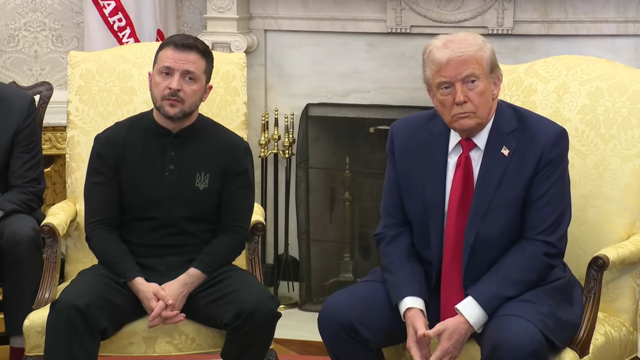The United States has halted intelligence-sharing with Ukraine, according to a report by the Financial Times, in a move that could have significant battlefield consequences for Kyiv. The decision follows the Trump administration's earlier suspension of military aid, signaling a broader pullback of American support for Ukraine's war effort against Russia.
According to the FT, two U.S. officials confirmed that Washington has "frozen intelligence channels with Kyiv." However, a Ukrainian official told Bloomberg News that intelligence-sharing was still ongoing, adding to the uncertainty over the extent of the policy shift.
The FT report also stated that while Ukraine is being cut off, intelligence on Russia and Ukraine is still being shared with close U.S. allies such as the United Kingdom.
The decision comes days after a tense Oval Office meeting between President Donald Trump and Ukrainian President Volodymyr Zelensky. The Ukrainian leader later described the meeting as "regrettable" and acknowledged that "it did not go the way it was supposed to."
Zelensky has since attempted to mend ties, stating on social media that Ukraine is "ready to come to the negotiating table as soon as possible" and that he would work under Trump's "strong leadership" to pursue peace. The Ukrainian leader also expressed gratitude for past U.S. military support, including the provision of Javelin missiles, which he credited with helping Ukraine maintain its sovereignty.
The loss of U.S. intelligence-sharing could significantly impact Ukraine's military operations, as Washington has provided crucial satellite imagery and targeting data throughout the war. Military analyst Mykhailo Zhirokhov, speaking to Al Jazeera, warned that a complete severance of intelligence-sharing could undermine Ukraine's air defense capabilities, particularly in major cities such as Kyiv and Odesa. He noted that U.S.-supplied Patriot missile systems, which have been critical in countering Russian airstrikes, rely on continued U.S. logistical and intelligence support.
Washington's actions have raised concerns among European allies, who were reportedly not consulted before the decision was made. Polish Prime Minister Donald Tusk described the suspension of aid as a major shift that could leave Europe facing "the biggest [security risk] in decades." He added that Poland was prepared to "intensify activities in Europe to increase our defense capabilities."
Germany's Foreign Minister Annalena Baerbock also addressed the situation, stating that two things were now essential: "additional aid-military and financial-for Ukraine, which is defending our freedom. And a quantum leap to strengthen our EU defense."
Political analysts suggest that Trump's latest moves are part of a broader strategy to recalibrate U.S. foreign policy. Kyiv-based analyst Igar Tyshkevych told Al Jazeera that Trump sees Ukraine as an obstacle in his efforts to realign global power dynamics. "Trump thinks he has to do it fast," Tyshkevych said. "To him, it's of paramount importance to finish pressuring Ukraine so that it agrees to concessions to Russia and to a ceasefire."
Meanwhile, political figures in the U.K., France, Canada, and Germany have used the moment to push for a stronger European defense strategy that is less dependent on Washington. Some analysts believe that despite the short-term risks, the situation could ultimately lead to greater European military coordination and investment.





